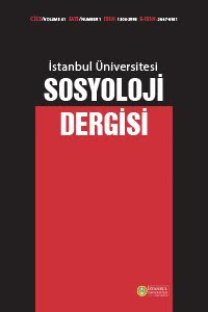TOPLUMSAL ALGI BOYUTUYLA SOKAKTA ÇALIŞAN ÇOCUKLAR: MERSİN ÖRNEĞİ
Bu makale sokakta çalışan çocuk olgusunu toplumsal algı boyutuyla değerlendirmektedir. Toplumsal algı kentlileşmiş ve kentlileşmemiş kesim özelinde ele alınmış ve her iki kesimin sokakta çalışan çocuklar hakkındaki benzeşen ve farklılaşan tutumları üzerine odaklanılmıştır. İlgili amaç çerçevesinde bir alan araştırması gerçekleştirilmiş, Mersin kent merkezinde ikamet eden ve orantılı tabakalı rasgele örnekleme tekniği ile belirlenmiş 250 katılımcıya anket uygulanmıştır. Ayrıca hem sokakta çalışan çocuklar hem de bu çocukların etrafında yer alan aile, komşu, öğretmen gibi farklı kişilerle derinlemesine görüşmeler gerçekleştirilmiştir. Araştırmada, kentlileşmiş ve kentlileşmemiş kesim çocuğun sokakta çalışmaması gerektiği ve bir ideal olarak eğitim kurumlarından yararlanması gerektiği konusunda benzer toplumsal algılara sahip olduğu tespit edilmiştir. Bu çalışma çocuğun sokakta çalışmasını meşrulaştıran ve onaylayıcı tutumları besleyen kültürel süreçlere de dikkat çekmektedir.
Anahtar Kelimeler:
Sokakta çalışan çocuk, kentleşme, toplumsal algı
-
The present study aims at exploring the phenomenon of working children on streets in terms of social perceptions of people from different levels of urbanization. The social perceptions as combined forms of attitudes of people toward working children on streets are investigated with regard to two broad categories, such as urbanized and unurbanized, and differences and commanilities of these attitudes of two categories people are analyzed. Within this framework, a field study was conducted on 250 participants living in different locations of Mersin based on a random stratified ratio technique of the population. Besides the field study, detailed interviews were realized on working children on streets and on their families, relatives, teachers, and neighbours. Findings indicated that both categories shared that the children should not work on streets and they should be at schools and benefit from educational resources of the society. Our findings clearly showed that the process of urbanization has already transformed people's perceptions to child as an economical value and that both categories people from unurbanized and urbanized have started to evaluate the working children on streets as “problem”. On the other hand, people see poverty and deprivation as major causes of the problem and regard that working on street could temporarily be a solution in order to deal with the poverty problems. The present study also aims to notice the cultural codes which help to sustain the phenomenon of working children on streets and tries to set a realistic ground for effective policy-making.
Keywords:
: Working Street Children, Urbanization, social perceptions.,
- ISSN: 1304-2998
- Başlangıç: 2020
- Yayıncı: İstanbul Üniv. Edebiyat Fak. Sosyoloji Böl.
Sayıdaki Diğer Makaleler
IMMANUEL WALLERSTEIN: ESERLERİ ÇERÇEVESİNDE ENTELEKTÜEL GELİŞİMİ
ULRICH BECK'İN RİSK TOPLUMU KURAMI
1929 EKONOMİK KRİZİ'NİN TÜRK BASININA YANSIMALARI
XIX. YÜZYIL AVRUPASINDA EMPERYALİZM ALGISI
Doç. Dr. Ali ERGUR, Yrd. Doç. Dr. Feyza AK, Didem DANIŞ, Yrd. Doç. Dr. Verda İRTİŞ, Yrd. Doç. Dr. İpek MERÇİL, Yrd. Doç. Dr. Buket TÜRKMEN, Nazlı ÖKTEN
DEVLET VE ÇOCUK İLİŞKİSİ BAĞLAMINDA SOSYAL HİZMETLER VE ÇOCUK ESİRGEME KURUMLARI ÜZERİNE BİR ANALİZ
TOPLUMSAL ALGI BOYUTUYLA SOKAKTA ÇALIŞAN ÇOCUKLAR: MERSİN ÖRNEĞİ
